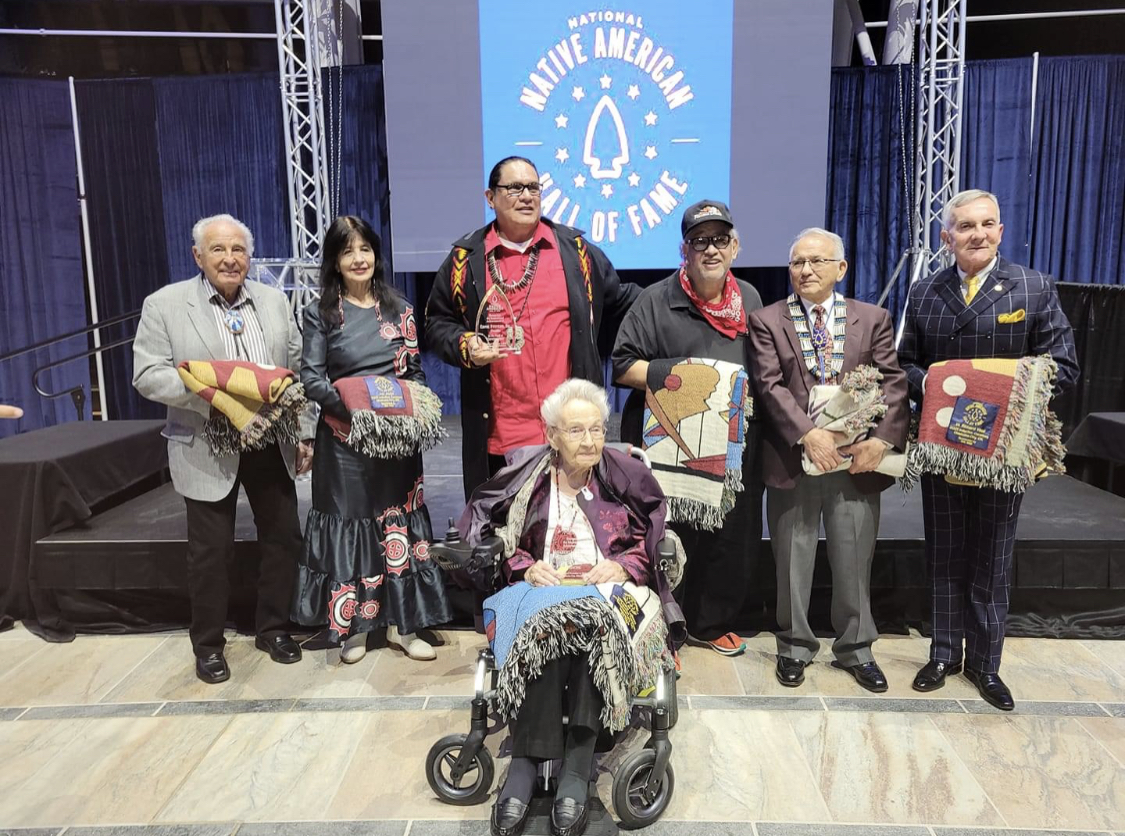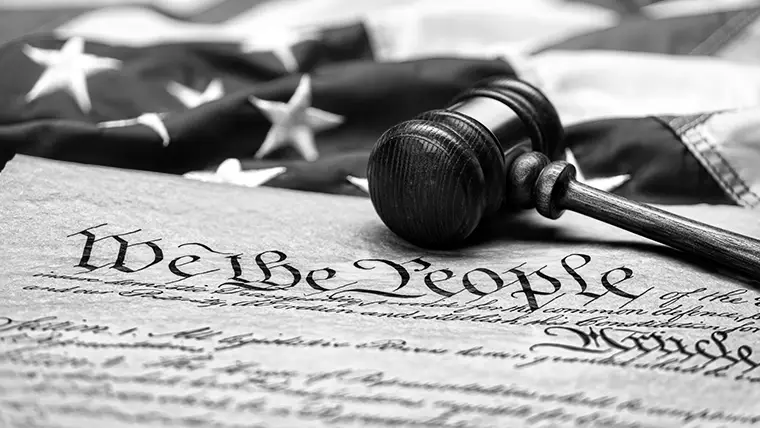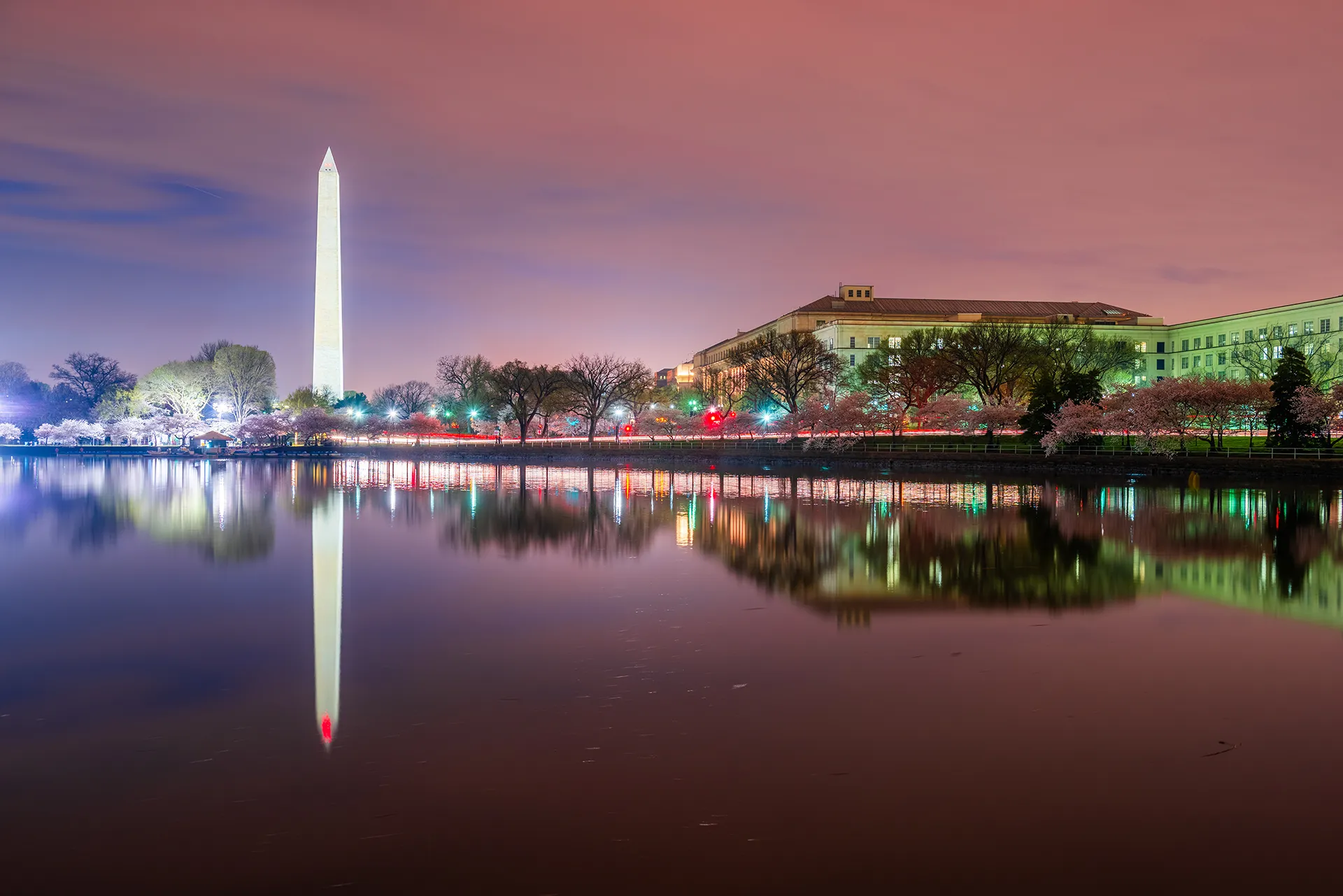November 9, 2021

Washington, D.C. (November 06, 2021)– On Saturday, November 6, 2021, the National Native American Hall of Fame inducted their 2021 Hall of Fame recipients at a gala held at the First Americans Museum in Oklahoma City, Oklahoma.
The 2021 Hall of Fame inductees includes Dave Anderson, Ojibwe, businessman, and entrepreneur; Sen. Ben Nighthorse Campbell, Northern Cheyenne; Joy Harjo, Muscogee (Creek), poet; Marcella LeBeau, Cheyenne River Sioux, health policy leader; Emil Notti, Athabascan leader; Katherine Siva Saubel, Cahuilla, language preservationist, and museum founder; Ernie Stevens Sr., Oneida leader; and W. Richard West, Southern Cheyenne, founding director of the National Museum of the American Indian.
The honorees are recognized for their leadership, sacrifice, mentorship, legacy, accomplishments, and contributions to Indian Country.
National Indian Gaming Association Chairman Ernie Stevens, Jr., accepted on behalf of his father Ernie Stevens, Sr. at the induction ceremonies. Upon accepting, Stevens, Jr, said, “It is such an honor to accept this recognition on behalf of my father. He dedicated his life to working towards the betterment of Indian country. And for him to be recognized alongside other great leaders in Indian country makes this moment so much more special.”
Walter Lamar, National Native American Hall of Fame Board President said, “The Incredible ceremony reminded all present the inductees robustly represent the generational strength given us by our ancestors. Their accomplishments and deeds extend well beyond our Native community and serve to remind others we are still here, and not only are we just here, but we are also excelling and leading the way.”
Ernie Stevens, Sr., Oneida, served numerous leadership positions including as executive director of the Los Angeles Indian Center, the Institute for Community Anti-Poverty Corporation, the Inter-Tribal Council of California, the Indian Action Project in Arizona, the American Indian Policy Review Commission, and served on the LA Human Rights Commission, He was First Vice President of the National Congress of American Indians and the first Staff Director to the Senate Select Committee on Indian Affairs.
He advocated for sovereignty, self-determination, self-governance, and Native rights for nearly half a century. Serving with the Bureau of Indian Affairs, Stevens was integral to changing the course of Indian Policy from an arena of termination to tribal self-determination.
A U.S. Marine Corps combat veteran, serving during the Korean War, he earned the Korean Unit citation and the Korean Service Medal with three battle stars. Ernie finished his career after returning home to Oneida. He served in various capacities including as a consultant, a Tribal Council member, and finally as the Nations Development Director, where he oversaw development during the expansion of tribal government gaming.
Other distinguished honorees include:
Dave Anderson, a member of the Lac Courte Oreilles Lake Superior Band of Ojibwe, established Famous Dave’s Barbeque, a national restaurant franchise. He served as head of the Bureau of Indian Affairs, CEO of the Lac Courte Oreilles tribal enterprises, served on the Wisconsin Council on Tourism, Wisconsin’s Council on Minority Business Development, the National Task Force on Reservation Gambling, the Advisory Council for Tribal Colleges and Universities, and the American Indian Education Foundation. In 2002, Oprah Winfrey’s Angel Network awarded a grant to Anderson’s LifeSkills Center for Leadership, an organization dedicated to supporting at-risk Indian youth. Anderson was named a Bush Leadership Fellow, Minnesota and Dakota’s Emerging Entrepreneur of the Year by Ernst and Young, NASDAQ, and USA Today, and was named Restaurateur of the Year in 1988 by Minneapolis-St. Paul Magazine.
Ben Nighthorse Campbell, Northern Cheyenne, became the first Native American to serve in the U.S. Senate in more than 60 years. Campbell served 22 years in public office, beginning his political career in 1982 as a state legislator in Colorado. In 1987 he moved to the U.S. House of Representatives and in 1992 was elected to two terms in the Senate. He served as a member of the Appropriations Committee, Energy and Natural Resources Committee, Veteran’s Affairs Committee, and the Indian Affairs Committee. He also chaired the Helsinki Commission and was the first Native American ever to chair the Indian Affairs Committee. Campbell was one of 44 Northern Cheyenne chiefs and was a Korean War veteran, serving in the Air Force. He was a renowned, award-winning artist and accomplished athlete, serving as captain of the U.S. judo team in the 1964 Olympics in Tokyo, Japan.
Joy Harjo, Muscogee (Creek), was the first Native named U.S. poet laureate in 2019; she has since been named to three consecutive terms. Harjo’s honors include the Lifetime Achievement Award from the Native Writers Circle of the Americas, the Josephine Miles Poetry Award, the Wallace Stevens Award from the Academy of American Poets, the William Carlos Williams Award from the Poetry Society of America, and the American Indian Distinguished Achievement in the Arts Award. She has received two National Endowment for the Arts fellowships, as well as fellowships from the Arizona Commission on the Arts, the Rasmuson Foundation, the Witter Bynner Foundation, and a Guggenheim. She has won an American Book Award, the PEN Center USA prize for creative nonfiction, the Ruth Lilly Prize for Lifetime Achievement, and the Delmore Schwartz Memorial Award. She is a founding board member of the Native Arts and Cultures Foundation.
Marcella LeBeau, Cheyenne River Sioux, is highly regarded for her health policy leadership spanning eight decades. Le Beau was a registered nurse and served in the U.S. Army Nurse Corps during World War II where she tended to the wounded from the D-Day invasion in Normandy and the Battle of the Bulge. Her fortitude and courage was recognized with the awarding of six highly distinguished medals, including the French Legion Medal of Honor, awarded in France in 2004 at the 60th Anniversary of D-Day. She was inducted into the South Dakota Hall of Fame and received the Women in History Award in 2016 from the Spirit of the Prairie Chapter of the Daughters of the American Revolution. LeBeau has contributed to the health and well-being of Lakota people, World War II soldiers, and diverse populations of people. She served on the Cheyenne River Sioux Tribal Council from 1991 to 1995.
Emil Notti, Athabascan, was the first president of Alaska Federation of Natives, founded in 1966. Notti was a force behind the land claims movement and central to the negotiations that culminated in the Alaska Native Claims Settlement Act of 1971. The legislation authorized Alaska Natives to receive title to 44 million acres of public land in Alaska and a $962 million land claims settlement, further establishing village and regional Native corporations. He was instrumental in calling for a convening of Alaska Natives from every region of the state. An electronic and aeronautical engineer, he worked on the Minuteman Ballistic Missile and worked for the Federal Aviation Administration. Notti served under several Alaska governors as Deputy Commissioner of Health and Social Services, Commissioner of Community and Regional Affairs, and Commissioner of Commerce, Community, and Economic Development.
Katherine Siva Saubel, Cahuilla, founded the Malki Museum at the Morongo Reservation in California—the first Native American museum created and managed by Native people. A leader, scholar and activist for the preservation of language and culture, she translated traditional folklore, created the first Cahuilla-English dictionary, wrote several ethnobotanical books on medicinal plants and made recordings of Cahuilla songs, preserving sacred ceremonies, culture and traditions. She was the first Native woman from California to be inducted into the National Women’s Hall of Fame in 1993 and awarded the Chancellor’s Medal from the University of California, Riverside as well as an honorary doctorate from La Sierra University. She served as tribal Chairman for the Cahuilla. Saubel is honored post-houmous, having passed away in 2011 at the age of 91.
W. Richard West, Southern Cheyenne, was the founding director of the Smithsonian Institution’s National Museum of the American Indian. West successfully guided the development and opening of the three facilities that comprise the National Museum of the American Indian including the Cultural Resources Center in Suitland, Maryland, the George Gustav Heye Center in New York City, and the celebrated opening of the NMAI on the National Mall in Washington, D.C in 2004. He was brought out of retirement in 2013 to become President and CEO of the Autry Museum of the American West in Los Angeles. West practiced law at the Indian-owned law firm of Gover, Stetson, Williams & West, P.C. He served as counsel to numerous American Indian tribes, communities, and organizations. He is a member of the Southern Cheyenne Society of Peace Chiefs.
Established in 2016, the National Native American Hall of Fame serves as a unique resource for identifying and honoring these contemporary path makers, new heroes, and significant contributors to American society.
The National Native American Hall of Fame help’s people understand how Native Americans overcame the hopelessness of early reservations, and the trauma of Indian boarding schools, poverty, discrimination, racism, and the cultural divide to not only adapt but to achieve greatness in every field, profession, and industry.
BIA Publishes Final Rule for Section 293 Class III Tribal-State Gaming Compacts

Remembering and Honoring the Legacy of Dr. Martin Luther King, Jr.

Statement From The Chairman Of The Indian Gaming Association: “Compromise or Collision Course: Americans Need Government to Function”
